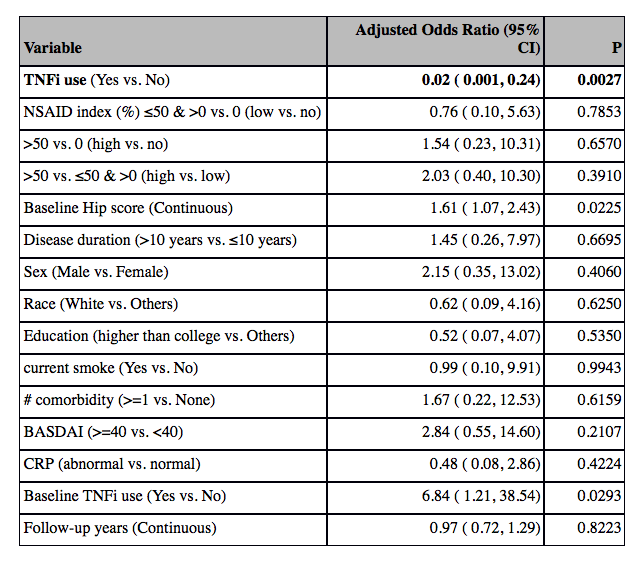Session Information
Session Type: ACR Poster Session A
Session Time: 9:00AM-11:00AM
Background/Purpose: Ankylosing spondylitis (AS) is a chronic inflammatory disease that affects the spine, sacroiliac joints, hips and peripheral joints. Clinical hip involvement is a common manifestation seen in many AS patients. 5% of AS patients have severe hip disease requiring total hip arthroplasty (THA). NSAIDs and TNFi are the pharmacologic standard of care in AS. Little is known about the impact of any treatment on hip disease while some studies have shown TNFi to be associated with less spinal radiographic progression. It is not clear whether TNF inhibitors (TNFi) prevent radiographic hip progression. Our hypothesis to be tested is that TNFi delays radiographic hip progression in AS patients.
Methods: We included 613 AS patients meeting the modified New York criteria and had at least 2 sets of hip radiographs. Using the Bath Ankylosing Spondylitis Radiologic Index (BASRI) for the hips, a progressor was defined as having hip scores change by at least two units between the first and last visits. We included patients with BASRI hip scores below 4 (n=579) for the progression analysis and selected a grade-2 BASRI score change to eliminate concerns associated with reliability for reading grade-1 scores. We performed a logistic regression analysis evaluating multivariable associations between TNFi use (defined as those who used TNFi for more than 50% of their follow-up period) and hip progressors after controlling for other factors such as follow-up period, baseline hip scores, baseline TNFi use, NSAID index over follow-up period, study sites and clinical/demographic variables (disease duration, sex, education level, race, current smoking status, BASDAI, CRP and comorbidities).
Results: Of the 576 patients analyzed, 551 were deemed to be non-progressors and 25 were progressors (median follow-up years=3). TNFi use was related to a lower probability of being a hip disease progressor (adjusted OR=0.02; p=0.003 – Table 1). There was not a significant interaction between NSAID and TNFi use.
Conclusion: TNFi use was associated with less radiographic hip progression in our cohort of patients with AS. There was no significant interaction effect found between NSAID and TNFi use.
To cite this abstract in AMA style:
Scaramangas-Plumley D, Lee M, Rahbar MH, Gensler LS, Reveille JD, Weisman M. Hip Disease Treatment and Progression in Ankylosing Spondylitis [abstract]. Arthritis Rheumatol. 2016; 68 (suppl 10). https://acrabstracts.org/abstract/hip-disease-treatment-and-progression-in-ankylosing-spondylitis/. Accessed .« Back to 2016 ACR/ARHP Annual Meeting
ACR Meeting Abstracts - https://acrabstracts.org/abstract/hip-disease-treatment-and-progression-in-ankylosing-spondylitis/

